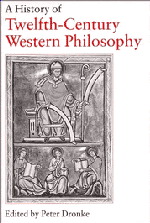Book contents
- Frontmatter
- Contents
- Preface
- Contributors
- List of abbreviations
- Introduction
- I Background
- 1 Philosophy, cosmology, and the twelfth-century Renaissance
- 2 The Platonic inheritance
- 3 The Stoic inheritance
- 4 The Arabic inheritance
- II New Perspectives
- III Innovators
- IV The Entry of the ‘New’ Aristotle
- Bio-bibliographies
- General Bibliography
- Index of Manuscripts
- General Index
2 - The Platonic inheritance
Published online by Cambridge University Press: 01 June 2011
- Frontmatter
- Contents
- Preface
- Contributors
- List of abbreviations
- Introduction
- I Background
- 1 Philosophy, cosmology, and the twelfth-century Renaissance
- 2 The Platonic inheritance
- 3 The Stoic inheritance
- 4 The Arabic inheritance
- II New Perspectives
- III Innovators
- IV The Entry of the ‘New’ Aristotle
- Bio-bibliographies
- General Bibliography
- Index of Manuscripts
- General Index
Summary
For a characterization of twelfth-century Platonism – apart from the constant presence of Platonic influences mediated by the Greek and Latin Fathers, especially Augustine, which can be considered a ‘common property’, part of the natural ‘climate’ of the Middle Ages – it is necessary to consider the influence of a group of writings which, though already known in the early Middle Ages, only now took on a central importance in many debates, and were responsible for establishing new themes: in the first place the Timaeus, the great philosophical Genesis, where Plato evolved the cosmological framework within which his programme of moral and political reform was to be located, proposing a new relationship between the sensible and the intelligible through the myth of the Demiurgos and the mediation of the world-soul. The dialogue had already been a major point of reference in the Hellenistic period, not only for the various Platonic schools, but for the whole wider context of philosophical speculation in late antiquity. In the Middle Ages the Timaeus – of which only the first part, devoted to the cosmological exposition (17a–53b), was known – was accompanied by the commentary of Calcidius, who oriented his interpretation of the dialogue according to the hermeneutic suggestions of Middle and Neo-Platonism, in particular those of Numenius and Porphyry: Calcidius not only laid emphasis on the meaning and value – religious and at the same time rational – of the contemplation of the cosmos, the sensible incarnation of the intelligible order, but resolved the cosmological myth of the Timaeus into a more organized system, which provided an interpretation and location for figures whose ontological state and reciprocal relations had been left ill-defined in the poetic fabric of the Platonic dialogue.
- Type
- Chapter
- Information
- A History of Twelfth-Century Western Philosophy , pp. 54 - 80Publisher: Cambridge University PressPrint publication year: 1988
- 12
- Cited by



